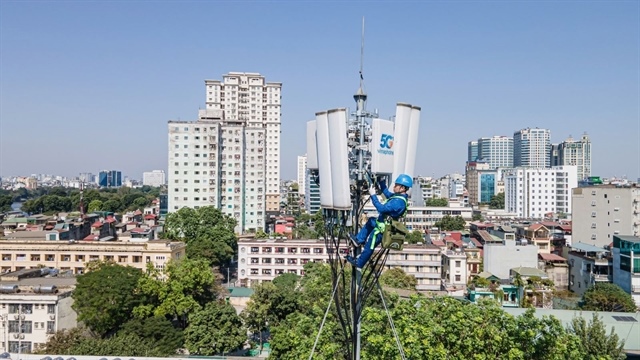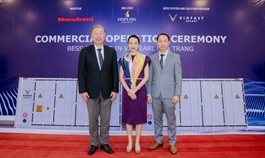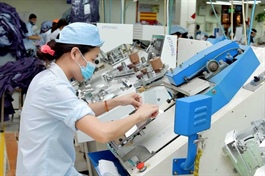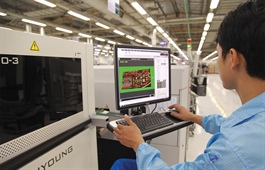Smart manufacturing still in early stages
Smart manufacturing still in early stages
Việt Nam's smart manufacturing remains in its early stages, with much work to be done before the nation fully embraces these transformative technologies, according to industry experts and insiders.

A worker performs inspections at a telecom station in Hà Nội. — VNA/VNS Photo Minh Sơn |
The combination of 5G technology and AI-driven automation is being discussed as a game-changer for the manufacturing industry.
However, Việt Nam's smart manufacturing remains in its early stages, with much work to be done before the nation fully embraces these transformative technologies, according to industry experts and insiders.
They emphasised how these technologies could significantly improve efficiency, productivity and global competitiveness.
Nguyễn Tuấn Huy, head of Digital Transformation at MobiFone Telecommunications Corporation, shared findings from a recent VINASA survey conducted in HCM City’s industrial and export processing zones. The survey, involving 98 enterprises, revealed that 61 per cent of businesses still rely entirely on manual labour, with only 25 per cent achieving partial automation. Even more concerning, 25 per cent of businesses lack any smart technology integration or connectivity in their production lines.
“This data underscores the untapped potential for developing smart factories in the country,” said Huy, urging businesses to adopt comprehensive digital transformation strategies rather than relying solely on connectivity provided by 5G.
According to Lê Bá Tân, head of Engineering at Viettel, around ten million of Viettel’s 66 million mobile subscribers own 5G-compatible devices, with six million already using the service. Moving forward, Viettel aims to prioritise enterprises requiring tailored 5G networks, such as industrial zones and ports, while continuing to meet individual customer demands.
Việt Nam has been making strides in 5G deployment. Vietnamese telecom operators, including Viettel, have officially rolled out commercial 5G services nationwide. By mid-October 2024, Viettel had installed over 6,500 base stations, ensuring coverage in 63 provinces and cities, industrial zones, airports, ports, and universities.
Nguyễn Quốc Khánh, deputy head of Technology at VNPT Group, highlighted lessons learned from 5G pilot projects in Europe, citing notable examples like a car factory in Spain. Integrating 5G into its production line allowed the factory to achieve a 10 per cent cost reduction, a 30 per cent improvement in defect detection, and a 50 per cent faster customer service response time.
“These pilots demonstrate the clear benefits of 5G, not just in reducing operational costs but also in improving the customer experience and solving environmental problems,” said Khánh, stressing the potential for similar outcomes in Việt Nam, provided businesses are willing to invest in upgrading their production lines and adopting automation.
Despite these promises, the path to widespread adoption is not without challenges. Khánh said, while 5G offers advantages such as faster speeds and lower latency, B2C customers may be unwilling to pay a premium for these benefits. Similarly, B2B customers, although recognising its value, face significant hurdles in overhauling their business models and investing in digital transformation.
Another pressing issue is the fragmented nature of Việt Nam's industrial sectors. Medium-sized factories scattered across the country often lack resources or knowledge to transition to smart manufacturing. A lack of understanding about smart factories among many businesses further hampers progress.
Coordinated efforts
Former Deputy Minister of Information and Communications Lê Nam Thắng stressed the importance of a holistic approach to 5G deployment.
“Telecom operators need to provide comprehensive solutions, not just network coverage. This includes devices, applications, and workforce training,” he said.
Thắng likened 5G deployment to building a road, adding: “If you build a road but no cars are running on it, it’s a waste.”
He urged telecom operators to synchronise network infrastructure development with the availability of devices, applications, and skilled human resources.
Government support remained a crucial factor, he said. He called for policies that create a conducive environment for 5G adoption, such as tax incentives and grants for businesses willing to invest in automation. Collaboration between telecom operators, technology providers, and enterprises will be key to unlocking the full potential of 5G in Việt Nam.























